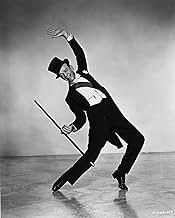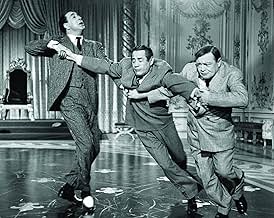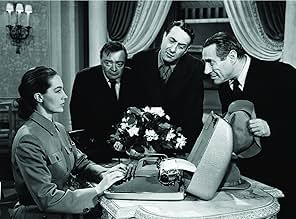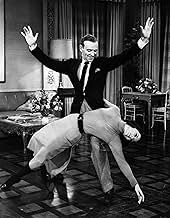Après que trois agents soviétiques maladroits aient échoué dans leur mission de récupérer un compositeur soviétique égaré de Paris, la belle et ultra-sérieuse Ninotchka est envoyée pour term... Tout lireAprès que trois agents soviétiques maladroits aient échoué dans leur mission de récupérer un compositeur soviétique égaré de Paris, la belle et ultra-sérieuse Ninotchka est envoyée pour terminer leur mission et les récupérer.Après que trois agents soviétiques maladroits aient échoué dans leur mission de récupérer un compositeur soviétique égaré de Paris, la belle et ultra-sérieuse Ninotchka est envoyée pour terminer leur mission et les récupérer.
- Récompenses
- 5 nominations au total
- Restaurant Patron
- (non crédité)
- Wife
- (non crédité)
- Soviet Guard
- (non crédité)
- Model
- (non crédité)
- Model
- (non crédité)
- Reporter
- (non crédité)
- Dancer
- (non crédité)
- Tenant
- (non crédité)
Histoire
Le saviez-vous
- AnecdotesAfter this film, Fred Astaire effectively retired from musicals, preferring to concentrate on non-musical roles, though he would produce several musical specials for TV in the next few years. He wouldn't make another musical until La Vallée du bonheur (1968).
- GaffesIt becomes fairly obvious during the "Fated to be Mated" duet between Fred Astaire and Cyd Charisse that Charisse is wearing a skirt one moment and culottes (or flared shorts) the next. The bottom half of her costume changes on each cut of the dance when they are doing deep knee bends, and this is where the culottes show. For the upright spins and lifts, the skirt shows. The dance was obviously performed twice and edited into one sequence.
- Citations
Vassili Markovitch, Commisar of Art: I want to look somebody up. Does this office have a copy of Who's Still Who?
- ConnexionsEdited into Histoire(s) du cinéma: Une histoire seule (1989)
- Bandes originalesI've Got You Under My Skin
(1936) (uncredited)
Music by Cole Porter
Heard at the beginning as Steve and Boroff arrive at the hotel
The story is based on Ninotchka, the female Soviet commissar who comes to Paris and finds romance reluctantly...and then enthusiastically. Paris is presented as a place where decadence was never more innocent and persuasive.
One of the things that seems so odd is that, for a Fred Astaire film, Astaire spends a good deal of time doing knee drops, full-length on-the-floor sprawls and athletic dance moves that limit the sophisticated and smooth Astaire style. He was 59 when he made the picture, and this might explain the relative shortness of some of the sequences. Still, while he is assured and immensely watchable (and while he can still do wonders with a cane), three major dance productions he is in just seem choppy.
Most of the songs from the Broadway show were retained and Porter wrote a couple of new ones. It's become routine with Porter to say that whatever his latest show was, the score was never one of his best. In this case, it's true. The romantic songs are great, but the topical specialty numbers just seem tired. Siberia and The Ritz Roll and Rock in particular miss the mark, in my opinion.
Astaire, as always, is first class. Charisse is easy to look at and a fine dancer. George Tobias, as a commissar in Moscow and Ninotchka's boss, gives a sly and dead-pan performance. Some of Porter's songs are very good. Mamoulian brought the film in on time and under budget. And Silk Stockings was a success with ticket buyers.
Meilleurs choix
- How long is Silk Stockings?Alimenté par Alexa
Détails
Box-office
- Budget
- 1 853 463 $US (estimé)
- Montant brut mondial
- 9 755 $US
- Durée1 heure 57 minutes
- Mixage
- Rapport de forme
- 2.35 : 1
Contribuer à cette page


































